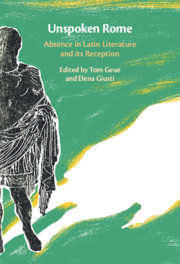Book contents
- Unspoken Rome
- Unspoken Rome
- Copyright page
- Contents
- Figures
- Unspoken Rome: Acknowledgements
- Contributors
- Introduction
- Part I Absence in Text
- Chapter 1 Catullus’ Sapphic Lacuna
- Chapter 2 Speaking Aposiopeseis
- Chapter 3 Allegorical Absences
- Chapter 4 Tamen apsentes prosunt pro praesentibus
- Chapter 5 Absence Left Wanting
- Chapter 6 The Gaze on the Void
- Part II Absence in Context
- Part III Going Beyond
- Afterword Lights Out
- Bibliography
- General Index
- Index Locorum
Chapter 4 - Tamen apsentes prosunt pro praesentibus
Proxied Absences and Roman Comedy
from Part I - Absence in Text
Published online by Cambridge University Press: 03 September 2021
- Unspoken Rome
- Unspoken Rome
- Copyright page
- Contents
- Figures
- Unspoken Rome: Acknowledgements
- Contributors
- Introduction
- Part I Absence in Text
- Chapter 1 Catullus’ Sapphic Lacuna
- Chapter 2 Speaking Aposiopeseis
- Chapter 3 Allegorical Absences
- Chapter 4 Tamen apsentes prosunt pro praesentibus
- Chapter 5 Absence Left Wanting
- Chapter 6 The Gaze on the Void
- Part II Absence in Context
- Part III Going Beyond
- Afterword Lights Out
- Bibliography
- General Index
- Index Locorum
Summary
In the opening of Plautus’ Casina the prologue warns the audience: ‘in case you’re waiting for [Euthynicus], he isn’t returning to the city in this comedy today. Plautus didn’t want him to. (64–6)’. The adulescens Euthynicus never becomes present onstage, and yet he is not completely absent either: his mother ‘knowingly supports him in his absence’, by supporting him against her lascivious husband. Euthynicus is not alone: Roman comedy is populated by a crowd of absent characters who are represented on stage by (guileful) proxies. Thanks to the poet’s imagination all these absent characters become present, and through their proxies they ‘benefit us in their absence as if they were present’, as the same prologue of Casina proclaims (20), with reference to the most important proxied absence of all, Plautus himself. There is something inherently theatrical about ‘proxiness’ and (Roman) comedy, a genre performed by actors proxying absent playwrights, featuring slaves proxying absent masters, and written by playwrights proxying both the Roman elite and the (lost) Greek models. The aim of the chapter is to delve into the world of proxied absentees in Roman comedy, investigating their meta-theatrical potential and the comic force of ‘proxiness’ in general.
Keywords
- Type
- Chapter
- Information
- Unspoken RomeAbsence in Latin Literature and its Reception, pp. 67 - 88Publisher: Cambridge University PressPrint publication year: 2021

